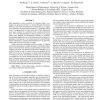1428 search results - page 14 / 286 » Affective scene generation |
GECCO
2006
Springer
14 years 1 months ago
2006
Springer
Estimation of Distribution Algorithms (EDAs) are a class of evolutionary algorithms that use machine learning techniques to solve optimization problems. Machine learning is used t...
CSL
2002
Springer
13 years 9 months ago
2002
Springer
A spoken language generation system has been developed that learns to describe objects in computer-generated visual scenes. The system is trained by a `show-and-tell' procedu...
ICIP
2010
IEEE
13 years 7 months ago
2010
IEEE
Most approaches to learn classifiers for structured objects (e.g., images) use generative models in a classical Bayesian framework. However, state-of-the-art classifiers for vecto...
APGV
2009
ACM
14 years 4 months ago
2009
ACM
Popping is a major source of visual artifacts in dynamic scenes. To alleviate or avoid it, usually some temporal smoothing scheme is employed or levels of detail are chosen conser...
TAP
2008
Springer
13 years 9 months ago
2008
Springer
on the perception of visual realism. This study suggests that post-recall or simple abstraction of visual experience is not accurate and the use of eye tracking provides an effecti...


